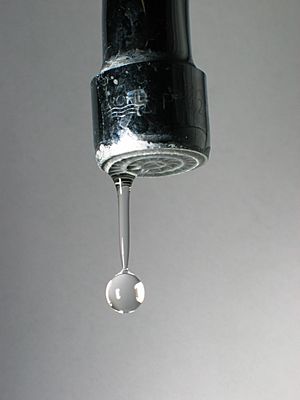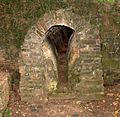Hard water facts for kids
Hard water is a type of water that has a lot of minerals dissolved in it. Think of it like water that's picked up extra "stuff" on its journey through the ground. The opposite is called soft water, which has very few minerals.
The main minerals found in hard water are calcium and magnesium. These minerals are usually in the form of tiny charged particles called ions. Water can also pick up other dissolved metals, bicarbonates, and sulfates. Calcium often gets into water from rocks like limestone and chalk. Magnesium usually comes from a rock called dolomite.
Hard water is generally safe to drink and won't hurt you. In fact, the calcium in hard water can even be a small source of this important mineral, which helps keep your bones strong!
Contents
What Makes Water Hard?
Water becomes hard when it flows through or over rocks that contain minerals. As rainwater falls, it's naturally soft. But as it soaks into the ground, it passes through different layers of soil and rock. If these rocks, like limestone or chalk, contain calcium and magnesium, the water dissolves tiny bits of these minerals. This makes the water "hard."
The amount of hardness in water depends on the type of rocks in the area. Some places have very hard water because there are lots of mineral-rich rocks. Other places have soft water because the rocks don't contain as many minerals.
Is Hard Water a Problem?
While hard water is safe to drink, it can cause some issues around the house.
Soap Scum
Have you ever noticed a white, sticky film in your sink or bathtub after washing? That's called soap scum. When the minerals in hard water mix with soap, they don't dissolve properly. Instead, they form this sticky residue. This means you might need to use more soap or detergent to get things clean. It can also make your hair feel dull or your skin feel dry after showering.
Mineral Buildup
Another common problem with hard water is mineral buildup, also known as "scale." This happens when the minerals in the water dry and leave behind a crusty deposit. You might see this white or off-white buildup on:
- Faucets and showerheads
- Inside kettles and coffee makers
- In pipes and water heaters
This buildup can make appliances less efficient and even shorten their lifespan. For example, a water heater with a lot of scale inside has to work harder to heat the water, using more energy.
Dealing with Hard Water
If hard water causes too many problems, there are ways to deal with it. One common solution is a water softener. A water softener removes the calcium and magnesium minerals from the water. It uses a special process to swap these "hard" minerals for "soft" ones, like sodium. This makes the water much softer and reduces issues like soap scum and mineral buildup.
For smaller problems, you can use special cleaners to remove scale from faucets and appliances. Regular cleaning helps keep things looking good and working well.
Images for kids
See also
 In Spanish: Agua dura para niños
In Spanish: Agua dura para niños




